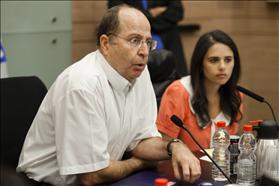A positive outlook for the new year
Nine Reasons why Hiddush is beginning 2014 on the right foot
Within the first few weeks of 2014, there have already been several noticeably positive strides regarding religion and state in Israel.
15/01/2014 14:47
Tags: freedom of religion · freedom of marriage · equality in sharing the burden ·

Defense Minister Moshe Ya'alon and Chair of the Committee to draft the Equality in Sharing the Burden Law MK Ayelet Shaked of Habayit Hayehudi in committee meeting. 9.15.2013. Photo: Flash90
1) Following years of legal battles, Israeli Reform rabbis are finally receiving their salaries from the State of Israel. Until now, the government paid Orthodox rabbis exclusively. This great news reflects the overwhelming majority of Israelis' opinion on the status of non-Orthodox Judaism. In Hiddush's 2013 Religion and State Index, 67% of Israeli Jews said rabbis from all major denominations should have equal standing.
2) On Rosh Chodesh Shvat (January 2, 2014) Women of the Wall were able to enjoy the monthly prayer service uninterrupted. The Haredi leadership, who previously instigated protests against the group, finally realized that their scare tactics had failed and only damaged their own standing. Hiddush's monitoring of the ultra-Orthodox media showed that this time, the Haredi leaders intentionally decided not to use seminar girls and yeshiva boys to protest which allowed the women to pray peacefully as had been intended.
3) The Yisrael Beiteinu party just introduced an initiative to close down Israel's religious councils and transfer their authority to relevant municipal (civil) councils. This initiative is long overdue and fully justified in light of the highly-politicized, corrupt, and wasteful religious council network throughout the country. Not surprisingly, this initiative is met with strong opposition from the Orthodox political and rabbinic establishment. It remains to be seen whether Yisrael Beiteinu will buckle under this pressure. Hiddush has been advocating for their elimination, but in the meantime, we have been turning to the Minister of Religious Services to push for drastic change in another area that has been lacking until now: full and adequate participation of women in leadership of the religious councils.
4) The Ministry of Justice has announced plans to change the law to subject city chief rabbis to an effective disciplinary code and provide the Ministry with a dominant role in executing that code. Currently, disciplinary action against rabbis is primarily in the hands of the rabbinic establishment and therefore is hardly ever enforced. Hiddush has been active in challenging a number of city and neighborhood rabbis over illegal actions committed during their terms.

Children at Talmud Torah in Beitar Ilit at the start of the new school year
5) The proposal for the Equality in Sharing the Burden Bill, designed to draft ultra-Orthodox yeshiva students, is nearing completion. The proposal is likely to come to a vote very shortly in the ad-hoc Knesset committee headed by MK Ayelet Shaked. This is the final step before reaching the Knesset plenum, which will bring the law to its 2nd and 3rd readings; the last two steps required in order to make it into binding law.
6) Under threat of financial collapse and growing external scrutiny for major deficiencies and disorders, the Shas party school system signed an agreement with the Ministry of Education committing to fully implement core curricular studies (Math, Science, English) with direct supervision and full transparency. Only time will tell whether this agreement will be implemented and enforced. Hiddush will keep close watch.
7) Hiddush and other like-minded organizations are working together to conduct a major campaign for freedom of marriage. There are encouraging indications that significant circles of American Jewish leaders are also interested in this issue and are exploring how they can best play a role in supporting these efforts. Hiddush has invested much energy in raising consciousness and encouraging Jewish leadership to take an active role in partnering with their Israeli equivalents to bring about change.
We expect that support for freedom of marriage will be further strengthened in the United States as a result of the Chief Rabbinate's recent attempts to question the halachic legitimacy of moderate Orthodox American rabbis, such as Rabbi Avi Weiss. The Chief Rabbinate's rebuke of Rabbi Weiss may have gained applause from their ultra-Orthodox sponsors, but as already seen by the response of moderate Orthodox leaders and by mainstream Jewish organizations, this extreme action will inevitably infuriate the American Jewish community. Many already view this latest controversy as an outrage and direct affront to their rabbinic leadership.

A haredi and a soldier using the bank services. 30.03.2008. Photo: Daniel Dreyfus, Flash 90
8) The proposed trip of "historical proportions" to the United States, as announced by Ashkenazi haredi leaders to protest the Equality in Sharing the Burden Law, was an embarrassing failure. The plans collapsed in a way that reflected growing internal disunity among Ashkenazi haredi factions and organizational inadequacy. With the passing of Shas' late spiritual leader, Rabbi Ovadiah Yosef, and the subsequent infighting among the party's leaders, there are similar rifts observed on the Sephardi side. The disunity among the Ashkenazi and Sephardi political factions portend a weakened haredi presence in the halls of power. This coincides with a peaking of public resentment of their excessive political pressures.
9) Following months of waiting, Hiddush's petition to the Supreme Court will be heard in a few weeks.The petition addresses the continued funding of yeshiva students despite the annulment of the Tal Law, which exempted tens of thousands of haredi men from conscription into the armed forces. This petition is one of the many avenues of action that Hiddush is engaged in to promote freedom of religion and equality in Israel. We have come to see that our research and advocacy work has given the cause of religious freedom and equality broad exposure in printed, electronic, and digital media. Our work is also providing a stronger foundation to advocate for religious freedom in the Knesset and in the courts.